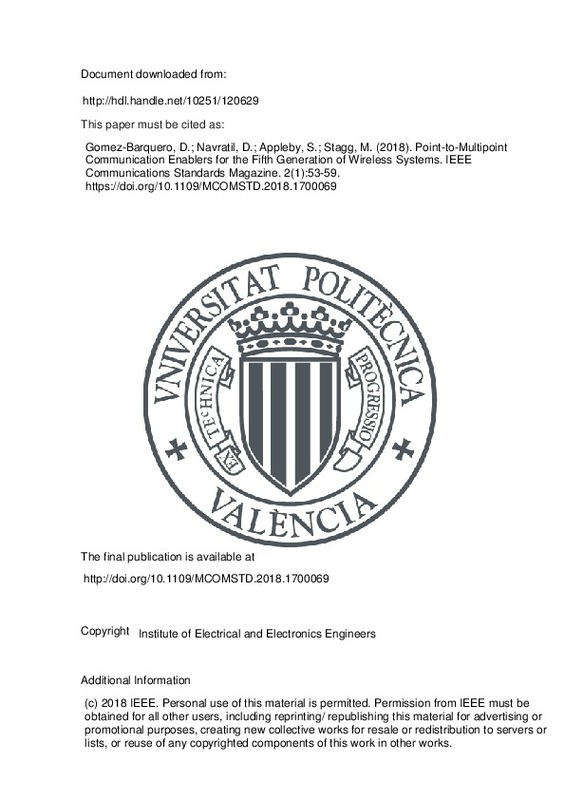Gomez-Barquero, D.; Navratil, D.; Appleby, S.; Stagg, M. (2018). Point-to-Multipoint Communication Enablers for the Fifth Generation of Wireless Systems. IEEE Communications Standards Magazine. 2(1):53-59. https://doi.org/10.1109/MCOMSTD.2018.1700069
Por favor, use este identificador para citar o enlazar este ítem: http://hdl.handle.net/10251/120629
|
Título:
|
Point-to-Multipoint Communication Enablers for the Fifth Generation of Wireless Systems
|
|
Autor:
|

 Gomez-Barquero, David
Navratil, D.
Appleby, S.
Stagg, M.
Gomez-Barquero, David
Navratil, D.
Appleby, S.
Stagg, M.
|
|
Entidad UPV:
|
Universitat Politècnica de València. Departamento de Comunicaciones - Departament de Comunicacions
|
|
Fecha difusión:
|
|
|
Resumen:
|
[EN] 3GPP has enhanced the point-to-multipoint
(PTM) communication capabilities of 4G LTE in all
releases since the adoption of eMBMS in Release-9.
Recent enhancements cover not only television services, but also critical ...[+]
[EN] 3GPP has enhanced the point-to-multipoint
(PTM) communication capabilities of 4G LTE in all
releases since the adoption of eMBMS in Release-9.
Recent enhancements cover not only television services, but also critical machine-type and vehicular
communications, following the backward-compatibility design philosophy of LTE. This article discusses
the opportunity in the design and standardization
of 5G to break with the existing paradigm for PTM
transmissions in 4G LTE, where broadcast PTM
transmissions were initially conceived as an add-on
and pre-positioned service. 5G brings the opportunity to incorporate PTM capabilities as built-in delivery
features from the outset, integrating point-to-point
and PTM modes under one common framework
and enabling dynamic use of PTM to maximize network and spectrum efficiency. This approach will
open the door to completely new levels of network
management and delivery cost efficiency. The article
also discusses the implications of PTM for network
slicing to customize and optimize network resources
on a common 5G infrastructure to accommodate
different use cases and services taking into account
user density
[-]
|
|
Palabras clave:
|
5G
,
5G-PPP
,
Broadcast
,
Caching
,
Core network
,
Critical communications
,
Machine-type communications
,
Media delivery
,
Multicast
,
Network slicing
,
Point-to-multipoint
,
Radio access network
,
Vehicular communications
|
|
Derechos de uso:
|
Reserva de todos los derechos
|
|
Fuente:
|
IEEE Communications Standards Magazine. (issn:
2471-2825
)
|
|
DOI:
|
10.1109/MCOMSTD.2018.1700069
|
|
Editorial:
|
Institute of Electrical and Electronics Engineers
|
|
Versión del editor:
|
http://doi.org/10.1109/MCOMSTD.2018.1700069
|
|
Código del Proyecto:
|
info:eu-repo/grantAgreement/EC/H2020/761498/EU/Broadcast and Multicast Communication Enablers for the Fifth-Generation of Wireless Systems/
|
|
Descripción:
|
(c) 2018 IEEE. Personal use of this material is permitted. Permission from IEEE must be obtained for all other users, including reprinting/ republishing this material for advertising or promotional purposes, creating new collective works for resale or redistribution to servers or lists, or reuse of any copyrighted components of this work in other works.
|
|
Agradecimientos:
|
This work was supported in part by the European Commission under the 5G-PPP project Broadcast and Multicast Communication Enablers for the Fifth-(H2020-ICT-2016-2 call, grant number 761498).
The views expressed in this ...[+]
This work was supported in part by the European Commission under the 5G-PPP project Broadcast and Multicast Communication Enablers for the Fifth-(H2020-ICT-2016-2 call, grant number 761498).
The views expressed in this contribution are those
of the authors and do not necessarily represent
the project.Generation of Wireless Systems 5G-Xcast
[-]
|
|
Tipo:
|
Artículo
|







![[Cerrado]](/themes/UPV/images/candado.png)


